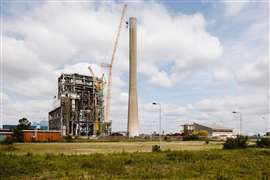Read this article in Français Deutsch Italiano Português Español
Volvo: ‘We needed to do compact equipment differently’
21 May 2024
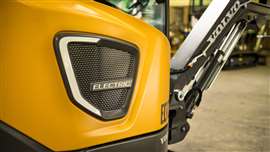 A compact electric Volvo excavator (Image courtesy of Volvo CE)
A compact electric Volvo excavator (Image courtesy of Volvo CE)
It’s getting on for a year since Volvo Construction Equipment announced that it was splitting off its compact construction equipment from its heavy machinery to create its own compact business unit.
Revealing the move in June 2023, Volvo said it wanted to give the unit responsibility for the whole value chain, including the development, assembly, purchasing and the go-to-market strategy (together with the existing distribution network) for the compact business unit.
It was a marked change and one that coincides with Volvo’s drive to offer a fully electric line-up across the whole range of compact machines.
To find out more about the thinking behind the decision, as well as an update on how it is progressing, Construction Briefing spoke to Thomas Bitter, Volvo’s former head of technology, who took on the role of head of the compact business unit from January this year.
Doing things differently
Bitter, based in Volvo’s factory in Belley, France, now heads a permanent team within Volvo that is completely dedicated to the compact business unit.
The process has been two years in the making. “We have evaluated how we perform in compact for years and years. And our president came to the conclusion that doing evaluations and analysis is one thing, but if we don’t do things differently, the outcome will still be the same,” Bitter says.
Compact machines might not generate the same margins as heavy machinery but it’s a volume game that represents 10,000 units per year to Volvo – a figure that Bitter believes could be significantly higher.
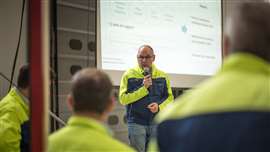 Thomas Bitter is leading Volvo’s compact business unit. (Image courtesy of Volvo CE)
Thomas Bitter is leading Volvo’s compact business unit. (Image courtesy of Volvo CE)
“The two main drivers for creating this business unit are dedication and focus,” says Bitter.
“Volvo’s portfolio is similar to other competitors. We have heavy machines and we have compact. And if you treat them alike, compact will be always the one that suffers. Because if you have to prioritize, then you go where the margin is. And for us that is with heavy machines - quarry customers, mining customers, construction and so on.”
While Volvo has always had people dedicated to manufacturing compact machines, much of the rest of the organization - the commercial, purchasing and development has been shared with heavy equipment. That has traditionally led to the compact side of the business losing out.
“If you take technology – which is what I did before – if there is a choice between core technology development for a heavy hauler or a small excavator, there’s always a priority towards the heavier equipment because it drives our revenue stream. To correct that, the executive management team decided to do something different,” he says.
Attracting new customers
Without naming any names, Bitter notes that there are other OEMs out there that have dedicated themselves entirely to compact equipment, which he takes as an illustration that the segment has always been set apart from other, larger machine types.
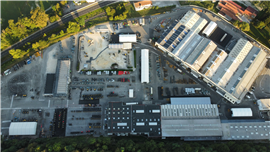 Aerial view of Volvo's compact equipment facility in Belley, France. (Image courtesy of Volvo CE)
Aerial view of Volvo's compact equipment facility in Belley, France. (Image courtesy of Volvo CE)
“If you look at the competitive landscape there are companies that don’t do big machines. And yet from a performance perspective, they are doing really well,” he says.
“That was an indicator for us. If an entire company only does compact and they hold that market share at that margin, then they must be doing something right. And that’s our benchmark for our part of this business – to grow it and extend it. We have set our objectives in profitability and market share and others show us that it is feasible.”
Existing Volvo compact equipment customers are unlikely to notice any difference following the change. But Bitter is interested in reaching the “other 95% market share customers” who Volvo has not yet reached.
“We are not in front of these customers. We only tap into a few of them and we want to cover the market requirements more broadly. We also want to do it for different segments within the compact world. We have the owner-operators. But a big part of compact is rental companies too.”
He adds, “That is one reason why we decided to create the business unit for a segment that has outgrown every other part of infrastructure or construction equipment in certain countries. Compact equipment represents half of the volume [of construction equipment sales], if not half of the business.”
Noting that Volvo has not always been set up well to serve these customers, he notes that while the simpler compact machines may require less maintenance and support, customers do need proximity.
“Maybe we haven’t had the network to provide this proximity. So we have to work on that. There are a lot of opportunities,” he says.
Making electric machines more attractive
Another advantage that a compact business unit offers is the opportunity to refine the electric machines that are core to Volvo’s strategy and make them more attractive to customers.
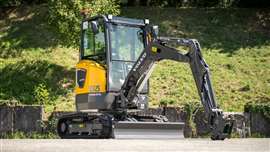 Volvo's ECR25 compact electric excavator is part of a growing lineup of electric compact machines. (Image courtesy of Volvo CE)
Volvo's ECR25 compact electric excavator is part of a growing lineup of electric compact machines. (Image courtesy of Volvo CE)
“The overall objectives of our company have not changed. Volvo Group has subscribed to science-based targets. From a group perspective, we have made the commitment to that by 2040, our portfolio should be entirely CO2 neutral, which then allows our customers to be CO2 neutral” says Bitter.
“And when it comes to compact equipment, the business unit should enable us to accelerate electrification.”
Bitter expresses hope that this also means developing the technology of machines to make them more efficient, more affordable, and consequently, more attractive to customers and end users.
“There are plenty of things to optimize the machine to make it more affordable, and that is really the big task. Because if you see the discussion on cars and trucks, if there’s not an incentive for the customer, then he or she will not change.
“Currently, our machines have an electric power source and hydraulic actuators. But there are a lot of possibilities with compact excavators because you can look at the boom, arm and bucket and see what else you could electrify. It’s up to us to lead and to convince customers, partners, dealer partners. And we can only convince them if the cost-benefit creation for the customer and for the dealer is correct.
“If we continue to believe that customers are happy to pay twice as much or to have much higher total cost of ownership for an electric or sustainable solution, it will not work. It will only address the early movers, the people that have a certain mindset. So we have to find efficient solutions,” he says.
Volvo will also be looking to offer solutions in areas where the benefits of CO2-free and low-noise machines are desirable, such as big metropolises. “We have to find this equation of right benefit, right cost,” he says.
“We are on a steep learning curve but I think we have a good base to start from.”
STAY CONNECTED


Receive the information you need when you need it through our world-leading magazines, newsletters and daily briefings.
CONNECT WITH THE TEAM









